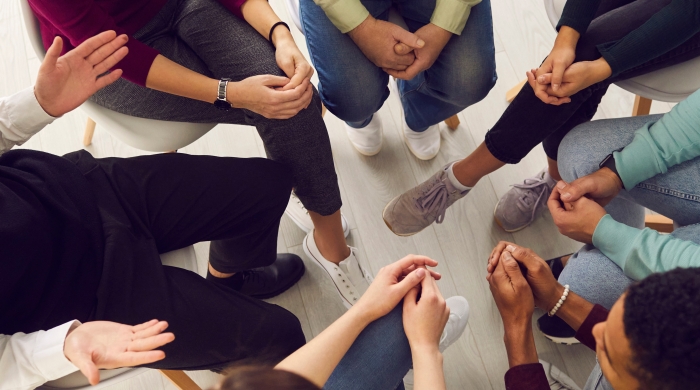This month's election showed that the economy remains a top priority for Americans. Americans are eager to see a rise in job opportunities and higher wages that reflect the cost of living and provide a more secure future. Overall, there's a strong desire for economic stability and security to enable families and individuals to thrive. How can we get there?
We know the economy does not work equitably for all people. Systemic racism and toxic individualism permeate the economic systems in which we operate, leading to exclusion for many individuals and families. To develop equitable solutions for the problems with our economy, we must hear from those most excluded from it. And, we must also learn from those on the ground already doing the work to advance economic justice for children and families in the areas of housing, employment, and beyond.
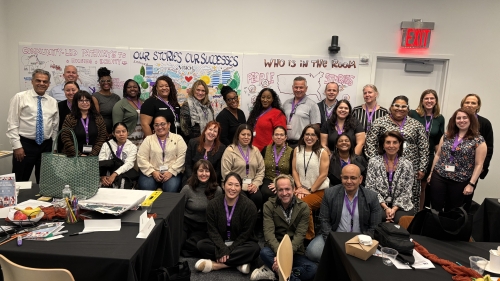
On October 16-18th, IHDSC hosted Our Stories, Our Solutions: A Summit on Transformative Solutions for Economic Equity in New York City. The summit brought together peers, parents, community leaders, practitioners, advocates, and researchers from across the country who are committed to improving the lives of children and families in the United States. Participants engaged in direct dialogue and collective reflection about their experiences, ideas, and work in the areas of economic justice, inclusion, and child and family well-being. We built relationships and seeded transformative community-driven pathways for action to advance economic inclusion in the United States by sharing in each other’s successes, challenges, and goals.
“The Our Stories, Our Solutions summit helped us as an organization take a pause and reflect on our progress and success, but also identify areas where there are gaps that we need to address,” said attendee Joseph Wright of Hope Street Margolis Family Center in Los Angeles, California. “It was inspiring to hear from a wide variety of people and to humanize the challenges children and families are facing today. This summit reenergized us, helped us refine our focus, and provided us potential tools for moving forward.”
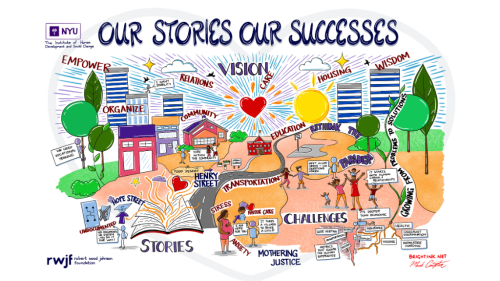
We kicked off the summit by welcoming everyone to New York City with a welcome dinner reception in the West Village. Together, we shared delicious French food, tips for first time visitors to New York City, and simply enjoyed the warm lighting and vibrant conversation as we got to know each other.
Summit attendees joined us bright and early at NYU’s 20 Cooper Square on Thursday, October 17th. The morning was all about storytelling. The first session grounded us in the space with those around us. We heard success stories highlighting linkages between individual experiences with economic systems and organizational supports that stepped in to uplift community members through difficult times. We discussed the intersection of housing, immigration status, working conditions, fair wages, food insecurity, social determinants of health, to name a few. We contemplated the question, “How can the system fail me when it’s not even designed for me?” and discussed the role racism and toxic individualism play in shaping our economic systems. We concluded the session by discussing ways, as a nation, we must reframe how we measure success. What would it look like if we moved away from assessing our success through GDP growth and financial wealth and instead measure human well-being through a happiness index or access to better living conditions?
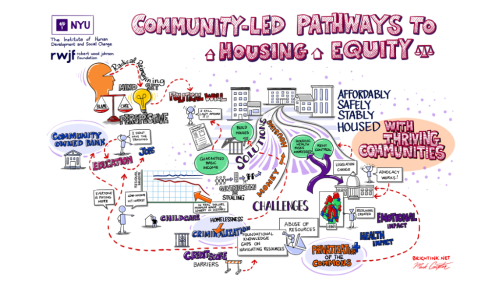
Following lunch out and about in New York City, participants returned to the summit space nourished and prepared to continue the rich discussion from the morning. The central theme of our afternoon session was housing equity, access, and opportunity. We heard from three leaders in the field, Ingrid Gould Ellen of New York University, Michelle de la Uz of Fifth Avenue Committee in New York City and Vivian Wan of Abode Services in the San Francisco Bay Area. Ingrid shared data showing the sharp increase in housing costs across the United States. She noted that higher housing costs are impacting everyone, but that low income households are experiencing less income left over than ever before. In fact, research shows that low income households have half as much money in their pockets after rent than they did 20 years ago. Michelle discussed the history of redlining in the United States and specifically New York City’s historic disinvestment in communities and the resulting decline in health outcomes. She discussed attending to housing equity at three levels: the individual level through workforce and family programs; the community level by physically redeveloping neighborhoods; and the systems level by increasing awareness and organizing local and state-wide campaigns for legislative change. Vivian of Abode Services described the widespread homelessness in the San Francisco Bay Area. The Bay Area, one of the wealthiest zip codes in the country, has become far out of reach for people at lower income levels. Vivian shared that the homeless crisis has disproportionately impacted Black and Brown communities. For Abode, housing ends homelessness and one way to tackle housing issues is through income assistance programs. When people have more money, they have more access to housing.
Following these remarks, we reflected on how these systemic issues appear within our own communities. The conversation underscored the pervasive impact of gentrification across U.S. neighborhoods and the untenable choices families need to make between essential needs, like housing and childcare. Participants highlighted the mismatch between the rising costs of housing and the stagnant federal minimum wage of $7.25 per hour. Yet, even beyond economics, systemic racism, toxic individualism, and a culture of exclusion and gatekeeping permeate these challenges, affecting access to healthcare, education, and housing—often disproportionately impacting Black, Brown, and immigrant communities. Participants shared stories of the “bootstrap” mentality that stigmatizes those in need and reinforces the idea that communities lack the knowledge to support themselves, creating additional barriers to equity. We questioned the necessity of the status quo, returning repeatedly to a key question: What if we did it a different way?
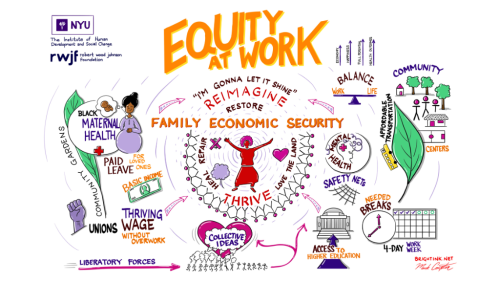
As the group delved deeper into root causes, we explored how the very design of economic and social systems objectifies people, rendering them mere transactions rather than whole humans. We expressed a strong desire to reframe success in society, shifting away from traditional economic metrics like GDP toward community well-being, happiness, and shared prosperity. We imagined a world where housing is valued as a human right, with policy centered around community care rather than economic growth. Attendees shared stories revealing that these issues are not isolated or unique but part of a broader, deeply ingrained pattern of neglect and disinvestment. The group expressed that resilience, while admirable, shouldn’t be a requirement to survive. We envisioned solutions rooted in community empowerment and collaboration, advocating for a world where we wouldn’t need to negotiate for fundamental rights but could instead focus on building sustainable, interconnected solutions for future generations.
The final day of the summit arrived in a flash. We started the morning discussing income and wealth disparities with Udochi Onwubiko of Dēmos and Cassandra Overton-Welchlin of the Mississippi Black Women’s Roundtable (MS-BWR) who shared their perspectives on the issue and what can be done to move the needle in the right direction. Udochi emphasized the need for fair wages and working conditions that allow people to thrive rather than merely survive. This includes bolstering labor rights, advocating for a living wage, limiting overwork, and ensuring that benefits like paid leave, reasonable hours, and fair treatment are standard for all workers. Udochi implored us to fight for a shift in focus from basic survival to overall well-being. Cassandra followed-on, invoking the spirit of Fannie Lou Hamer’s rally songs of salvation by bringing us together in song, singing “This little light of mine, I’m gonna let it shine.” Cassandra described how MS-BWR advocates for Black women’s economic inclusion and political empowerment. Her organization centers racial and gender equity, with initiatives like the Mississippi Voices storytelling project, which highlights healthcare disparities faced by Black and Latinx women. Cassandra described how her work builds on the legacy of Fannie Lou Hamer and creates spaces for joy, healing, and activism, aiming to establish a political home for Black women and girls to dream big. Her take home message: true freedom and economic inclusion must go hand in hand.
The wrap-up conversation explored reimagining systems to prioritize human dignity, joy, and equity over profit and productivity. We considered what it would mean to shift from a focus on mere survival to thriving, advocating for changes like universal paid leave, accessible income untethered to employment, and truly representative legislative bodies. The conversation also highlighted systemic barriers that uphold inequality, especially for Black and Brown communities, and the transformative power of coalition-building and organizing in advancing change. Success stories, like Michigan’s "Momnibus" bill package and investments in childcare, illustrate progress. Participants stressed the need for accessible resources, equitable representation, and support for all people, envisioning a future where freedom, well-being, and communal support are fundamental rights rather than privileges.
“It was incredible to realize that even when it seems really tough to shift our community support systems in Utah, I don't have to look too far to see bright spots of hope across our nation,” said Michelle Flynn, Executive Director of The Road Home of Salt Lake City, Utah. “And then realize that we too have our bright spots, and together we can weave our web of support and strengthen each other until we impact system change across our nation.”
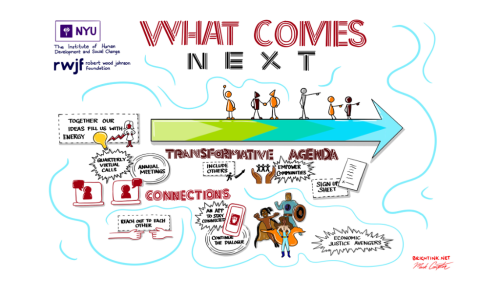
In the closing session, participants expressed a strong desire to continue collaboration beyond the summit, envisioning a network to sustain momentum, share ideas, and tackle common challenges across communities. The group discussed the value of gathering diverse voices, noting how connecting with others energized them to return to their communities with renewed determination. Many saw the opportunity to build a coalition that shares resources, highlights successes—big and small—and celebrates ongoing efforts toward economic justice and housing reform. There was a call for regular meetings, shared digital platforms, and the potential for a “win journal” to document progress collectively.
Participants emphasized that this coalition could shift the conversation about economic systems toward human-centered goals like joy, freedom, and well-being. We acknowledged the importance of accessible, inclusive spaces that elevate often-marginalized voices. Reflecting on structural inequities, participants urged continued reframing of issues such as housing, labor rights, and community resources. The summit’s diversity was seen as essential to breaking echo chambers and enabling open dialogue. By building this coalition and working as a unified force, participants aim to create a lasting impact and leave a legacy of progress.
“Attending the summit was an eye-opening experience for me. I personally realized that my thought processes and mindset has been limited when focused on solutions. This is most likely a result of the creation of a conditioned mindset from serial experiences of lack, microaggressions, and racism,” said ShaMeika Davis, Social Worker and Co-Founder of Davis Therapeutic Services in Mississippi. “However, it was so refreshing and enlightening to be amongst individuals who are committed to breaking down barriers and so open with sharing their insight, understanding, and experiences. I am grateful to have had the opportunity to be a participant.”
Funding support for this work was provided by the Robert Wood Johnson Foundation. The views expressed here do not necessarily reflect the views of the Foundation.
A special thank you to the summit's illustrator, Mark Compton of Bright Ink, who beautifully captured visual notes of the complex ideas surfacing throughout the discussion and encapsulated the essence of the room.




